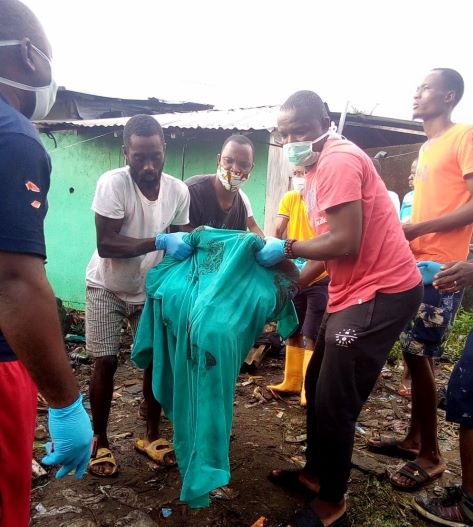PHOTO: Corpse of victim Michael Bunyan in body bag being conveyed by relatives and neighbors
By Samuel G. Dweh-Freelance Journalist,samuelosophy1@gmail.com/231-88661890
The lifeless body of Michael Bunyan, age 22, was under two white and red live electric cables hanging down the roof of a blue house in the Jallah Town Community in Sinkor, Monrovia on Friday, June 26, 2020.
This tragic incident comes hard on the heels of repeated warnings from the Liberia Electricity Corporation (LEC) about the danger of power theft and illegally tampering with the facilities of the national grid.
The body was lying on the other two halves of the wires above, when a team of armed members of the Liberia National Police (LNP), all wearing nose-and-mouth masks, in adherence to the anti-Coronavirus transmission measures, formed a barricade between Michael’s corpse (at where the current knocked him off) and a group of Jallah Town residents and passers-by.
After the police officers had left, sobbing, groaning and wailing from relatives and friends accompanied the lifting of the body by the deceased’s father and his friends.
“They say, what happened to my baby; they say, what happened to my baby?” a woman in tears said repeatedly.
Another young woman shouted: “Ay, Michael!” and slumped to the floor before the opened booth of a blue Jeep where the corpse had been laid to be taken to where the deceased’s family had in mind.”
“He died between twelve and one, when the rain was falling heavily, while he was doing the illegal connection,” a young man told to other people in the group.
Most of the narrations, from different persons, indicated that Michael Bunyan was killed by electric shock while he was running electric wires from the blue house one house to another (or vice versa) in the Jallah Town community.
This occurred under a heavy downpour that flooded most part of Jallah Town and many other communities in Liberia’s capital, Monrovia, beginning from 1pm of June 26. The flood also dislodged many families from their homes and destroyed many things in most of these homes. This writer’s family was also victim of the flood caused by the June 26 torrential rain—chased out and most of paper documents damaged.
“I never knew my son had been involved into power theft,” the deceased’s father, Melvin Kedor, told in the midst of the crowd of onlookers at the scene of the tragedy.
“Michael’s death mystified his childhood friend in the Jallah Town community, the living man told me after the corpse had been transferred from where he had been tragically shocked to the vehicle. Just last night, he asked me to give him money to go and take shag (drink wine), but all the money I had was for watching the football match between Chelsea and Manchester City,” the deceased’s friend, who introduced himself as Mickel Obi to this writer, disclosed.
Before his death to power theft, Michael Bunyan had been surviving on washing of tricycles—popularly called “Keke” in Liberia—another of the deceased’s male friends told me in a tricycle (being operated by another person) that took us from Lakpazee community to Central Monrovia.
“The keke-washing business makes good money—between eight hundred and nine hundred Liberian Dollar on each keke you washed at the keke-washing center. I used to see him working most of the tie,” John Woodtor, the “keh-keh” operator, Michael Bunyan’s friend, told me in the tricycle conveying us. “Only he or God can tell you or me why he left the keh-keh washing to stealing of electric power,” John added.
Widespread practice of power theft
Jallah Town, like most communities in Liberia, has been one of the power theft hotspots in a long time. It started since government of Ellen Johnson Sirleaf that was in power for 12 years (2006-2017) This “felonious crime” stretched over Mrs. Sirleaf’s presidency. It crossed over to the Presidency of global football legend-turned politician George Manneh Weah and is continuing with his leadership. Like it was during Mrs. Sirleaf’s Government, George Weah’s Administration appears unable to tame the ‘monster’ called power theft.

On October 4, 2019, President George Manneh Weah signed the Power Theft Act into law, criminalizing power theft and instituting significant penalties and fines for violators. The law defines stealing of electricity as “illegal connections, tampering with meters, transmission and distribution of line, and theft of assets, including light poles, wires and transformers.”
Two factors are responsible for power theft in Liberia, especially during the Country’s post-civil war era.
One factor is corruption in Government with the civil obligation to supply electric light to all homes in the Country. A sub-factor is national electric power authority’s continued months-or year-long delay to electrify homes whose owners or occupants had already paid for power-reading Meters with the Government. But Mrs. Sirleaf’s Governments failed to supply power to even 70% of homes in the Country, in spite millions of world’s top currencies it had received from the World Bank and many other Liberia’s International Development Partners for national electrification of Liberia. One example: Most of the homes in the Country’s capital city, Monrovia, do not have Government-supplied electric power—except the power from “tapped” home or Government’s street light poles (done during night time) Similar “corrupt practices” are being exhibited by the Government of George Manneh Weah. The Administration has received huge money from Liberia’s International Development Partners for a project titled “Light Up Monrovia” But most parts of the City can’t be legally ‘lighted up’ more than a year since the project money was released.
The second factor is poverty with majority of the Country’s population. Most Liberians—living in post-civil war Liberia—are financially handicapped, so are unable to pay for Government-regulated electricity for their homes and business centers. This financial disability pushes them to steal—similar to what Michael Bunyan was doing.
The Liberian government’s ‘limitation’ in supplying electric lights to business centers—and homes—is crippling local industries and pushing foreign investors out of Liberia.

